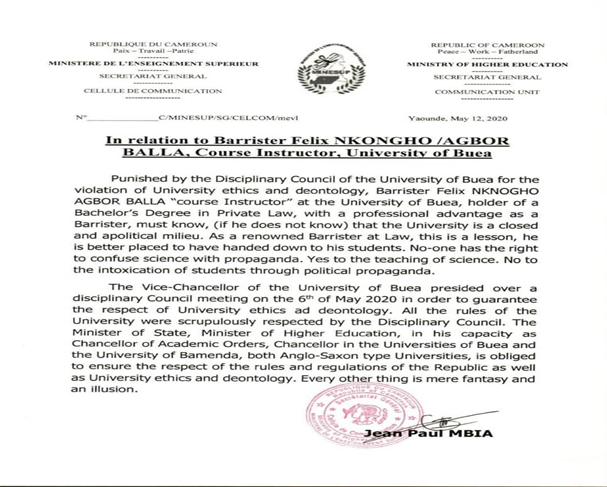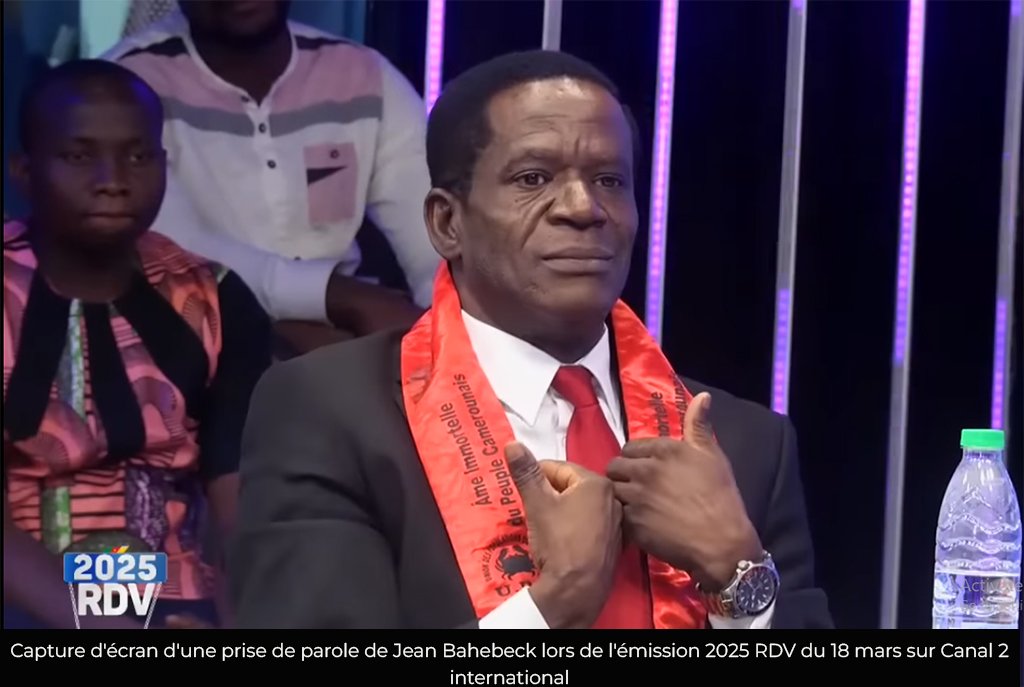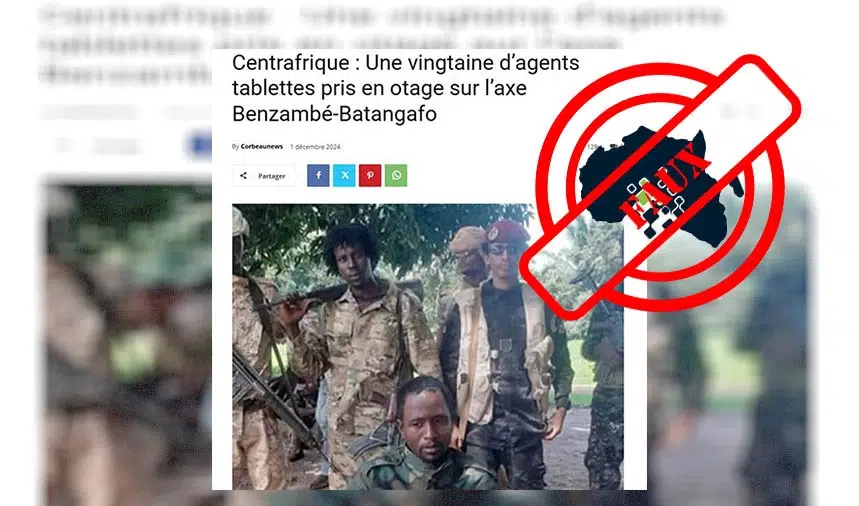On May 12, 2020, Jean Paul Mbia of the Communication Unit of Cameroon’s Ministry of Higher Education (MINESUP) claimed that Barrister Felix Agbor Anyior Nkongho alias Agbor Balla was recruited as instructor at the University of Buea with only a Bachelor’s Degree in Private Law and professional advantage as a Barrister. This is false after verification.
Contrary to the MINESUP Director of Communication’s claim, we understand Felix Agbor Anyior Nkongho’s profile is richer than was presented. He is a Barrister at Law of the Supreme Court of Cameroon and Nigeria. He graduated from the University of Yaoundé with an LLB in English Private Law, after which he attended the Nigerian Law School in Lagos wherein, he graduated with a BL Second class Upper Division with a 1st Prize in Civil Procedure.

Felix Agbor Anyior Nkongho was enrolled as a Barrister and Solicitor of the Supreme Court of Nigeria in December 1996. He holds an LLM (Cum Laude) in International and European Comparative Law at Vrie Universiteit Brussels and also an LLM (Cum laude) in International Human Rights and Humanitarian Law at the University of Notre Dame, USA.
Agbor Nkongho also holds a Diploma in Public International Law at Academy of International Law, Hague, Holland and a Diploma on Theory and Practice of Conflict Prevention in Africa, the University of Leipzig, Germany.
Agbor Nkongho worked as a Doctoral Researcher at the Centre for International Law University of Brussels, Associate Legal Officer at the International Criminal Court for Sierra Leone, Legal Officer Trial Chamber International Criminal Court for Sierra Leone, Human Rights Officer United Nations mission in Afghanistan, Legal Officer United Nations Police in DR Congo and Legal Officer UN Mission in Afghanistan.
He created the Committee for the Defense of Human Rights in 1998 and in 2005 it was transformed to the CENTRE for Human Rights and Democracy in Africa upon a meeting with other African students of the LLM program at Notre Dame University, USA.
He is the Vice President of the African Bar Association in charge of Central Africa, past President of Fako Lawyers Association (FAKLA) and the Founder and Chairman of the Centre for Human Rights and Democracy in Africa (CHRDA). Agbor Nkongho is equally founder and leads Agbor Nkongho Law Firm in Buea, Cameroon.
Felix Agbor Anyior Nkongho is a human rights lawyer, the first Chairperson of the Southern Cameroons European Coordinating Committee (SCECC) and led a delegation with ace human rights activist, Albert Mukong to the President of the EU Commission to discuss the Anglophone problem.
Agbor Nkongho has worked on several cases of marginalised and victims of human rights abuses. He led a peaceful strike action of lawyers and teachers to protest against the hyper centralised and majority French speaking government in Cameroon, which undermines the Common Law System and Anglo-Saxon Educational system of the minority Anglophones in Cameroon.
Agbor Nkongho was President of the now outlawed Cameroon Anglophone Civil Society Consortium (CACSC) which was comprised of teachers, trade unions and lawyers of the Common Law System who called for a return to Federalism as a system of government which will address structural discrimination and marginalisation of Anglophone people. The Anglophone Consortium was tasked to dialogue with the government on the Anglophone problem and negotiate a solution.
Agbor Nkongho was arrested on January 17, 2017 after several failed attempts by the government of Cameroon to negotiate a short-term solution to the Anglophone problem with him.
Agbor Nkongho was charged with terrorism, rebellion to incite civil war, revolution, contempt against the State, and secession which carried the death penalty. His arrest marked a wave of street protests, radicalization and demonstrations demanding his release. The government’s response was a brutal crackdown which further radicalised the population and many started demanding independence for the Anglophone regions.
The United Nations through François Lonseny Fall, Special Representative of the Secretary-General and Head of the United Nations Regional Office for Central Africa (UNOCA) visited Agbor Nkongho in Kondengui Maximum Security Prison and later called on the government of Cameroon to release him. Amnesty International, University of Notre Dame, The African Bar Association, The Law Society of Upper Canada, Front Line Defenders, Lawyers’ Rights Watch Canada, International Bar Association’s Human Rights Institute, Robert F. Kennedy Human Rights, Bar Human Rights Committee of England and Wales, Common Law Lawyers Association, Fako Lawyers Association and Central Africa Human Rights Defenders Network (REDHAC) actively advocated and called for his release.
On August 30, 2017, President Paul Biya issued a decree, stopping legal proceedings against Felix Agbor Anyior Nkongho and several others arrested who were facing trial before the military court.
As part of broad consultations after his release from jail, Agbor Nkongho held a meeting with all-party parliamentary groups in the UK House of Lords and discussed the Anglophone crisis at Chatham House.
He was consulted by Rt Hon Patricia Scotland QC, Commonwealth Secretary-General and Harriett Baldwin, UK Minister of State for Africa during separate official visits to Cameroon to discuss solutions to the Anglophone crisis. He met with Ambassador Peter Henry Barlerin, U.S. Ambassador to the Republic of Cameroon to discuss solutions to the Anglophone crisis.
Upon request by US Congress Foreign Affairs Committee, Agbor Nkongho presented a written statement for the Africa, Global Health, Global Human Rights, and International Organizations Subcommittee Hearing on the Crisis in the Republic of the Cameroon. He addressed the Canadian House of Commons Committee on International Human Rights. He recently issued a joint appeal for peace with German MP, Dr Christoph Hoffman. He equally recently briefed a high level German Parliamentary Delegation in the presence of the German Ambassador to Cameroon
Agbor Nkongho has written extensively on: « The Right of the Southern Cameroonians to self-determination under International Law », « An Appraisal of the Special Court for Sierra Leone », Referral of Sudan to the International Criminal Court, « The Law as a Mechanism for Women Discrimination in Sub-Saharan Africa ». He is a member of Cameroon Bar Association, Nigerian Bar Association, International Bar Association, Hague Academy of International Law.
As an activist he advocated for non-violent change and through his organisation, Centre for Human Rights and Democracy in Africa, he has documented thousands of cases of human rights abuses and violence in Cameroon while proposing a political and humanitarian solution to the Anglophone crisis in Cameroon to avoid a civil war or genocide.
Agbor Nkongho received the Award of Excellence by The Cameroon Returnees, he was honoured with the African Public Impact 2018 by African Achievers Award, and he was awarded the Mandela Human Rights Prize and recently honoured with the Guardian Post Newspaper with the award of Human Rights Achievement of 2018.
The University of Buea, on May 6, terminated a contract with Barrister Agbor Balla, citing the violation of the institutional ethics – setting a question on the Anglophone Crisis. To them, he violated the apolitical nature of the academic milieu in a course he taught: “Political & Constitutional History of Cameroon.”
UB’s decision followed Higher Education Minister’s order of April 20, urging the termination of Agbor Balla’s contract. According to Minister of State Fame Ndongo, Agbor Balla took his political ideology to the classroom.
The Human Rights advocate boycotted UB’s disciplinary council, citing non-respect of his fundamental human rights. He was recruited on June 2, 2015 as Instructor at the Department of Law at the University of Buea.
Atia Azohnwi
Partager la publication "No, Agbor Balla holds two master’s degrees, not only Bachelor’s Degree as Claimed by MINESUP’s Jean Paul Mbia"





